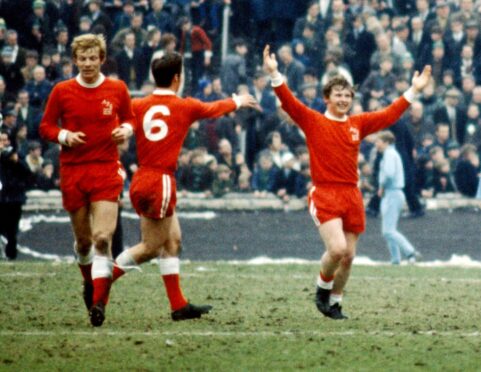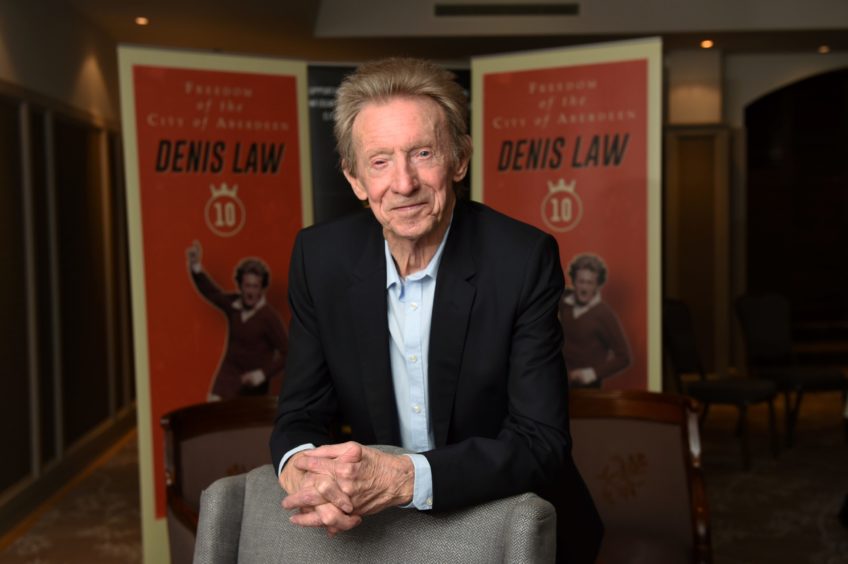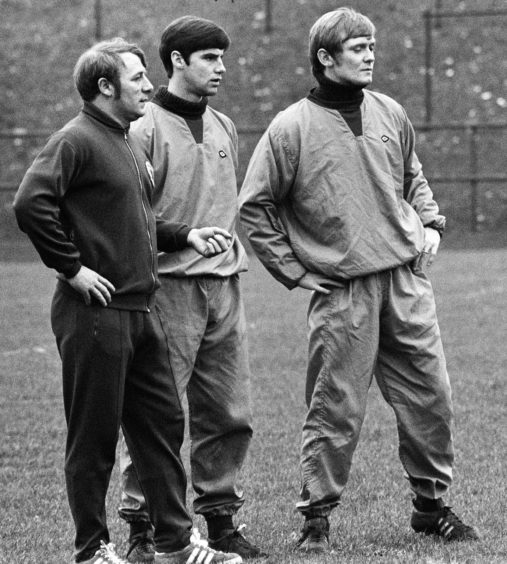He was one of the many gifted Scottish players to relocate to England during the 1970s.
But even now, 50 years after he left Aberdeen to join Manchester United, there’s still a sense of what might have been at Pittodrie for one of their greatest performers.
Martin Buchan, after all, was a bright-eyed, intelligent youngster with impressive leadership qualities which he displayed while captaining the Dons to glory in the 1970 Scottish Cup Cup final against Celtic at just 21.
He was an admirer of the coaching skills of Eddie Turnbull, whom so nearly steered his squad to Scottish championship glory in the 1970-71 campaign – and, if Turnbull, a member of Hibs’ Famous Five, had not returned to Easter Road, Buchan may well have chosen to stay in the Granite City.
Yet, in February 1972, he was signed by Frank O’Farrell for a club record £120,000 and joined the likes of Denis Law, Bobby Charlton and George Best.
It should have been the launchpad for the classy Scot to pursue trophies and triumphs on a regular basis, but this was a manic period for the Red Devils.
First, they lost the aforementioned “Holy Trinity”, for different reasons, with Best hitting the bottle, Charlton retiring and Law moving to Manchester City. Then, they plummeted to the second tier in 1974.
As somebody who always offered everything for his employers, whether in Scotland or England, Buchan was bemused by the fashion in which a merry-go-round of managers came and went at Old Trafford.
Matt Busby, for so long the beating pulse of the club, was succeeded by Wilf McGuinness, who memorably summed up his travails in the role after he was dismissed in December 1970 by saying: “I was only 31. It was like Ronnie Corbett marrying Dolly Parton: the job was too big for me!”
Busby briefly returned to the hotseat, but realised fresh blood was required and O’Farrell was given the responsibility for improving their fortunes.
No wonder Buchan was frustrated with the complacency of some of those around him, both before and after O’Farrell’s sacking in 1972 and the appointment of Tommy Docherty, who soon encountered his own issues.
He recalled: “The 1972-73 season saw us on a downward spiral, unacceptable for a club of our stature, and a 5-0 defeat at Crystal Palace led to Frank being replaced and the Doc drafted in a number of Scots such as Lou Macari, George Graham, Alex Forsyth and Jim Holton.
“We struggled at the wrong end of the table for much of the season and then the unthinkable, relegation, happened.
“Some of the squad thought we were too good to go down, the same people who had let Frank O’Farrell down.
“It was by far the biggest disappointment of my career, but I resolved to stay at Old Trafford and help United back to the First Division.
“The fans stayed loyal and we played in front of record crowds in an exhilarating roller-coaster ride which saw us bounce straight back, thanks in no small part to the goalscoring feats of Stuart Pearson and Macari.”
After rejoining the elite, United reached the FA Cup final in consecutive seasons, in 1976 and 1977, but experienced contrasting fortunes along with the thousands of supporters who travelled to Wembley.
‘We’ll be back next year’
Buchan said: “I felt that we could have won the league had some of the players not been distracted by the FA Cup run, which ended in defeat by Southampton (courtesy of Bobby Stokes’ late goal).
“I well remember standing next to the Doc on the balcony of Manchester Town Hall when he told a packed Albert Square we would ‘go back and win it next year’. And the rest is history.”
But, although the manager was as good as his word, Buchan faced problems of his own as United prepared for their final showdown with Liverpool.
He said: “I feared I was going to miss out due to a knee ligament injury I picked up in the last league match at West Ham. I even told the manager on the morning after the game I might as well go back to Manchester.
“But he insisted I get on the bus and our physio Laurie Brown worked wonders and got me fit enough on the Saturday.
“With strapping on my knee and a belly full of anti-inflammatory tablets, I led the lads out, wondering if I was doing the right thing, but a 50-50 tackle with Tommy Smith dispelled my fears and let me concentrate on the task of marking Kevin Keegan.
“Rookie Arthur Albiston played the game of his young life as we beat the league champions 2-1 (with goals from Pearson and Jimmy Greenhoff).
“We were back at Manchester Town Hall on the Sunday, with the cup this time, and I had it in my hands as we came off the bus. The main building was locked up, so I asked the Doc: ‘What do I do with this?’
“Take it home and bring it back in the morning’, was the reply.
Martin Buchan, now 72, is one of the true legends of Aberdeen and Man Utd history. One wonders what other prizes he might have gained in a less turbulent decade and with colleagues who shared his desire and determination.
The Big Manchester United Book of the Seventies by Roy Cavanagh and Carl Abbott is available from Legends Publishing.
Related:
Relegation and redemption: Aberdeen great Martin Buchan recalls turbulent years at Manchester United


